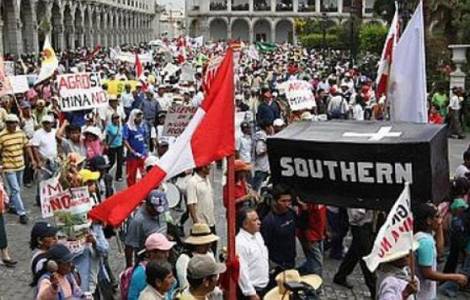
Arequipa (Agenzia Fides) - "The Presidency of the Peruvian Bishops’ Conference, in response to the reactions aroused by the 'Tía María Project', expresses concern about the possible development of this situation and shares the hope that appropriate dialogue can avoid a new social conflict. In this context, we approve the declarations of the National Assembly of regional governments and other social sectors, which have requested that dialogue is imposed concerning Tia Maria, before any action of the mine takes place": this is the urgent statement, signed on 12 July, of the presidency of the Peruvian Bishops’ Conference, sent to Fides, regarding the events in the area of Arequipa (about 800 km south of the Peruvian capital). On July 9, the Peruvian government awarded Southern Copper Corporation (SCC) the license to start building its Tia Maria mine after 10 years of administrative, environmental and social conflict.
The "Tía Maria" project of the Southern Copper Corporation (SCC), involves an investment proposed, in the year 2009, of over 950 million US dollars for a period of 21 years to extract the copper through two open-cast mines, using the aquifer situated in the valley of the Tambo river. The local population is firmly opposed to the project because it would reduce the availability of water, thus limiting the production of rice and sugar cane, as well as contaminating the Tambo river.
The SSC presented its environmental impact study right from the beginning, but it has been contested by 97% of the local population. In 2010 there were clashes at the start of the project, which resulted in 3 deaths and several dozen injuries due to the strong police repression. At the end of 2012 the company announced that it would present a new environmental project for Tia Maria, but this immediately caused the mobilization of the community, which denounced the incompatibility with their agricultural production activities. Despite everything, the environmental study was approved on 4 August 2014, the project envisaged to start work in 2016. The communities have since remained on alert and in continuous mobilization. On July 9, 2019, the government awarded the license to operate, but with some conditions, including ongoing dialogue to coordinate some additional work on the project.
According to local sources, Fides confirms the tension in the area, but the invitation of the Bishops of Peru has opened a new perspectiveon the issue, as in other similar situations the intervention of the Bishops’ Conference generated a responsible and peaceful solution, as in the cases of Las Bambas-Apurimac (see Fides, 29/3/2019), of the Conga Project, Cajamarca (see Fides, 11/30/2011) and of the city of Espinar, Cusco (see Fides, 8/6/2012). (CE) (Agenzia Fides, 13/7/2019)